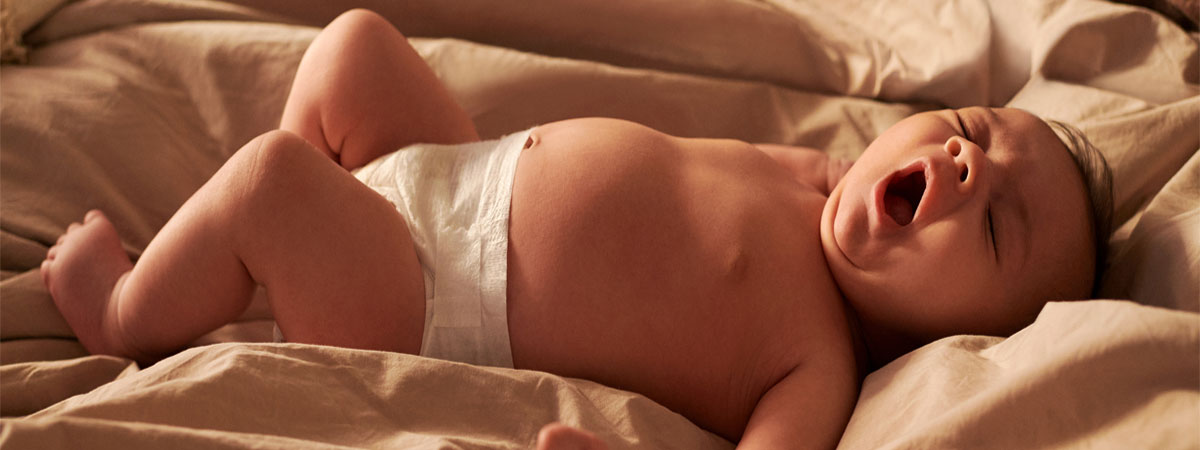
Helping your baby to sleep soundly
There is no universal method to get babies to sleep through the night without waking, but if baby's basic needs are met, you'll be well on the way to unbroken nights.
Most babies are around six months before they can sleep through a whole night without waking.
Smart feeding to help baby to sleep
Newborns, whether bottle-fed or breastfed, feed as much at night as they do during the day. It is a good idea to breastfeed your baby fully towards the end of the day, as this will make him drowsy and able to sleep for longer stretches at night. This may mean four or five or even more hours at a time, which is good for babies and their parents too! Most babies, however, are around six months before they can sleep all night without waking.
Babies who are fed infant formula tend to sleep longer at a time than breastfed babies because mother's milk is metabolised (used up) faster than formula. If your baby is bottle-fed, either with your own milk or infant formula, she may need more coaxing to fall asleep again after a night feed than a breastfed baby. This is thought to be because bottle-fed babies have to wait for their bottle to be prepared at night, and waiting gets them wide awake.
Three ways of settling your baby
While your baby is under six months, it is likely to need a safe embrace to fall asleep in. Body contact, warmth and calming movements are three factors that help to calm both children and adults. Your baby may settle even more easily if whoever of you feeds him also has skin-to-skin contact with baby. Similarly, your child may be settled by gentle rocking in your arms before putting him in the cot.
Bed-in-bed or sidecar cot
Studies have shown that the number of SIDS (sudden infant death syndrome) or cot death cases has gone down significantly since the recommendations that infants under three months should sleep in their own beds to reduce the risk.
Many parents solve this by attaching a baby cot to the side of the mother's bed, with the inner bars removed and the mattresses level, as a "sidecar" in the first few weeks. Another option is a bed-in-bed, meaning baby's cot in the bed. This keeps mummy and baby close, which also makes night feeds easier, while protecting baby from any risk of getting crushed.
Coping with baby's restless nights
If a baby takes a long time to fall asleep, has trouble staying asleep or sleeps fitfully, the reasons for this may be:
• something in baby's familiar surroundings has changed
• baby is developing in leaps and bounds; learning something new like crawling or walking
• overstimulation from all kinds of new impressions during the day
• the whole bedtime routine is too exciting
Think of ways to limit stimuli at bedtime. Especially if these are in the form of fun sounds and twinkling lights.
Baby's sleep
A newborn slips rapidly from one state of sleep to another. A tiny baby is not wakeful and calm for long and soon becomes restless. A newborn baby sleeps much of the time, but in short spells of about two to three hours.
They have relatively short sleep spells interrupted by other short spells in which they are fed, changed and perhaps start to explore their surroundings. Many newborns sleep between 16 and 18 hours a day. This differs from one child to the next, and after a couple of months their sleeping patterns change.
A soothing end to the day means better sleep
Your baby's mood will soon influence your own. Baby's happiness rubs off on you, and when baby is restless, you feel uneasy too. And it works the other way too; your mood affects baby. When settling baby for the night, the atmosphere should be calming and cosy.
Try to round off the day calmly and tenderly, focusing on the pleasure of going to bed after a full day. The simplest and easiest routine is for everyone in the family to follow your new baby's needs and natural tendency to fall asleep in the arms of an adult.
More about sleep
When your child is in harmony and sleeping well, it's good for everyone. Here are some more tips and advice.
Short videos:
Putting your baby to bed
Comforting your baby
Articles:
Better sleep for your baby
Good sleep habits
Create routines for your baby
Baby's sleep, 3–6 months
Baby's sleep, 6–8 months


